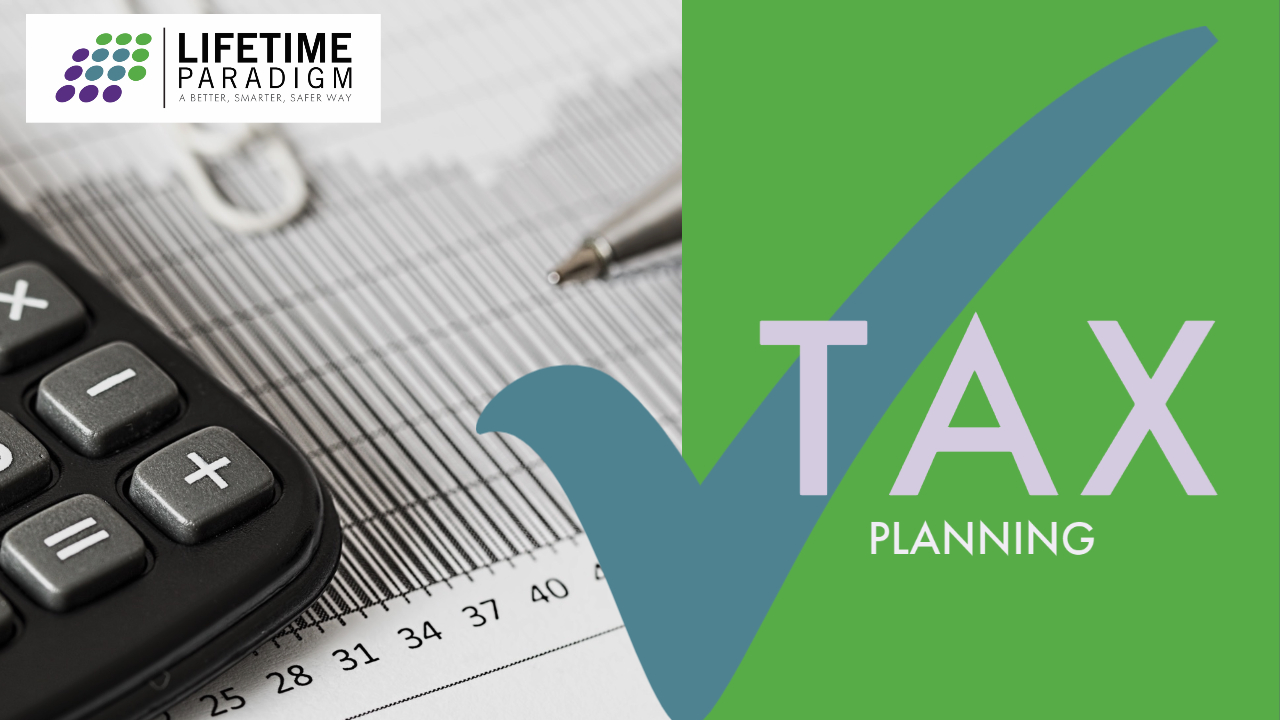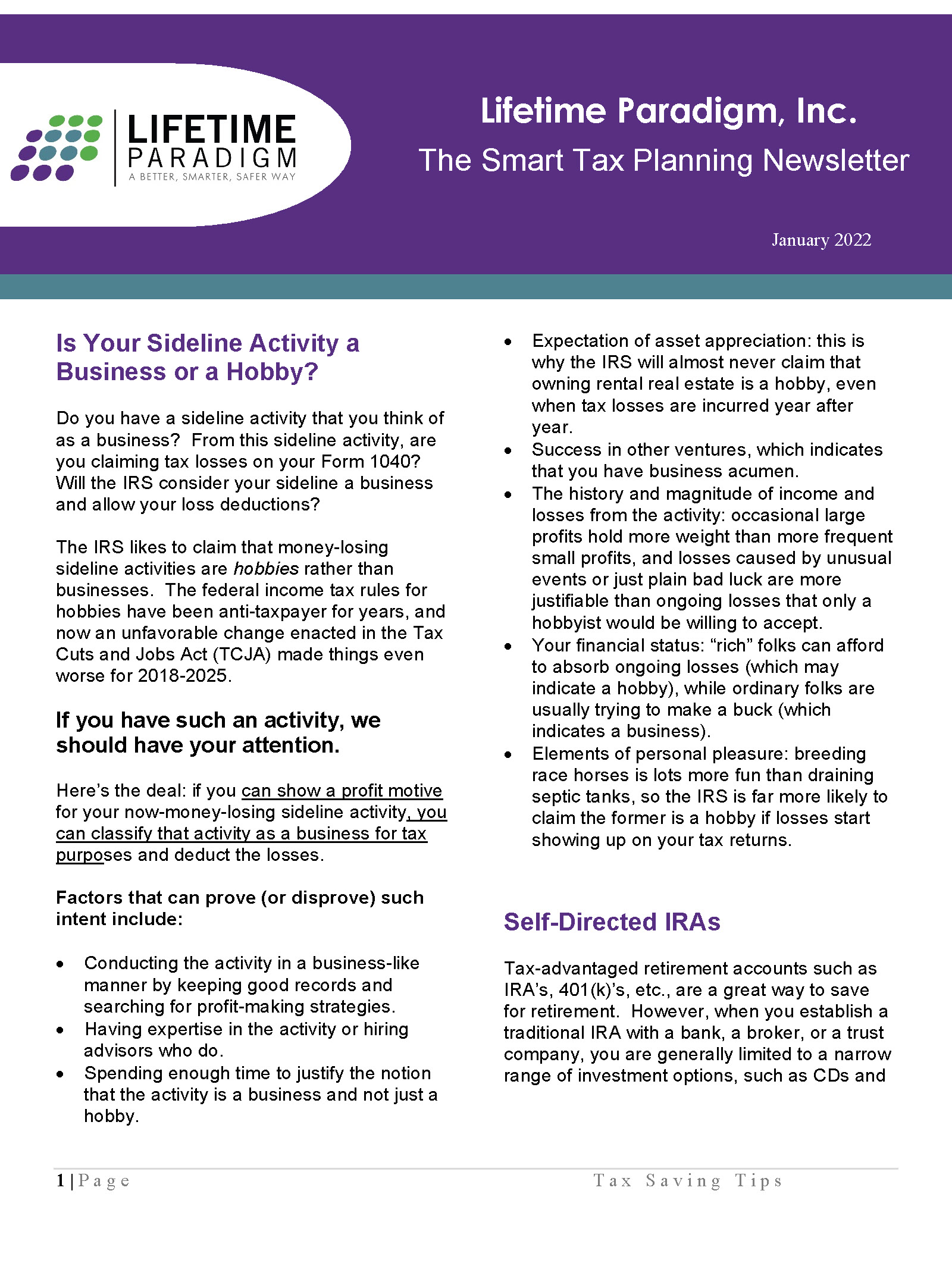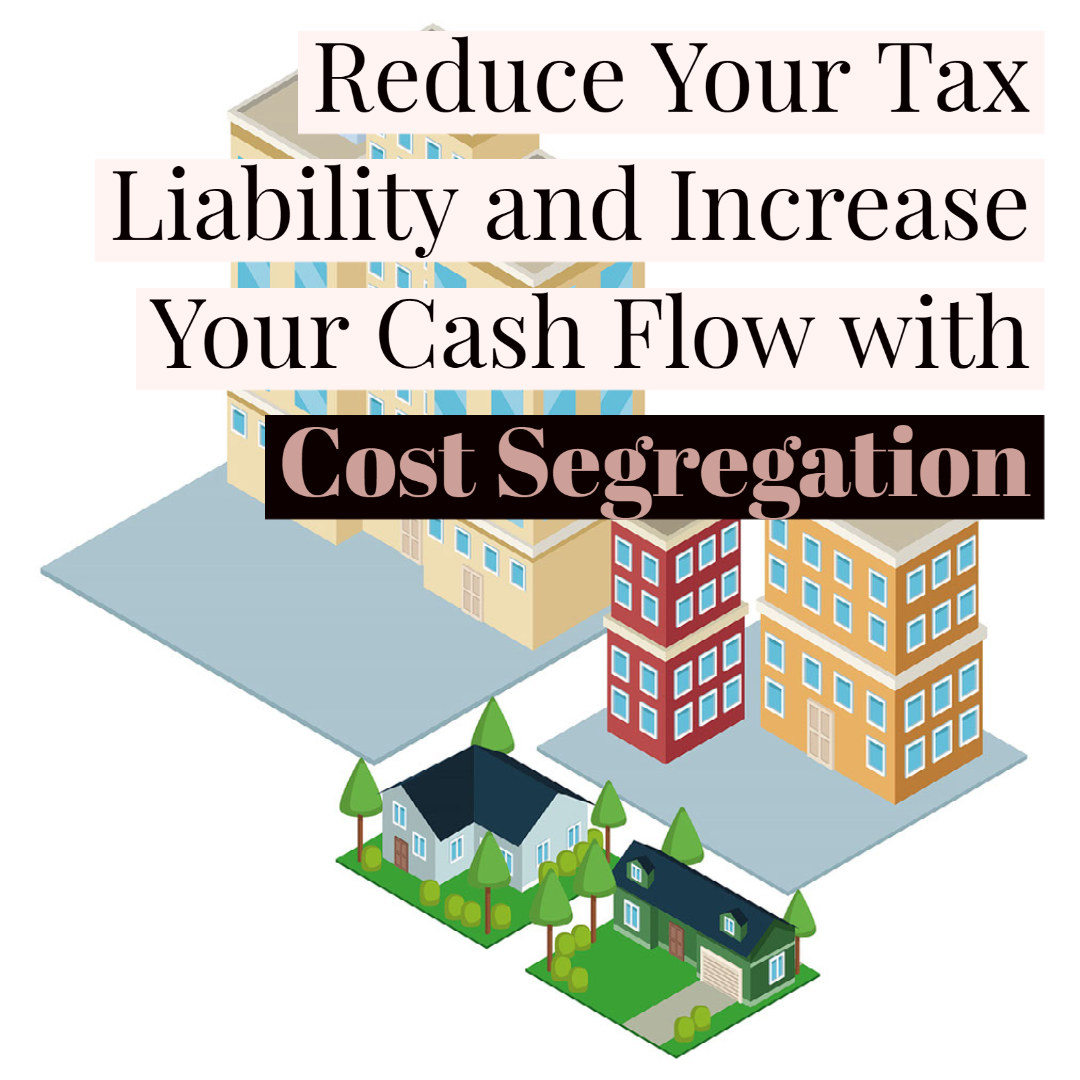Tax Planning
The Smart Tax Planning Newsletter January 2022
Every month we provide you with a fairly detailed review of several Important Tax Topics. Scan through the highlighted topics noted below.

Is Your Sideline Activity a Business or a Hobby?
Do you have a sideline activity that you think of as a business? From this sideline activity, are you claiming tax losses on your Form 1040? Will the IRS consider your sideline a business and allow your loss deductions?
The IRS likes to claim that money-losing sideline activities are hobbies rather than businesses. The federal income tax rules for hobbies have been anti-taxpayer for years, and now an unfavorable change enacted in the Tax Cuts and Jobs Act (TCJA) made things even worse for 2018-2025.
If you have such an activity, we should have your attention.
Here’s the deal: if you can show a profit motive for your now-money-losing sideline activity, you can classify that activity as a business for tax purposes and deduct the losses.
Factors that can prove (or disprove) such intent include:
- Conducting the activity in a business-like manner by keeping good records and searching for profit-making strategies.
- Having expertise in the activity or hiring advisors who do.
- Spending enough time to justify the notion that the activity is a business and not just a hobby.
- Expectation of asset appreciation: this is why the IRS will almost never claim that owning rental real estate is a hobby, even when tax losses are incurred year after year.
- Success in other ventures, which indicates that you have business acumen.
- The history and magnitude of income and losses from the activity: occasional large profits hold more weight than more frequent small profits, and losses caused by unusual events or just plain bad luck are more justifiable than ongoing losses that only a hobbyist would be willing to accept.
- Your financial status: “rich” folks can afford to absorb ongoing losses (which may indicate a hobby), while ordinary folks are usually trying to make a buck (which indicates a business).
- Elements of personal pleasure: breeding race horses is lots more fun than draining septic tanks, so the IRS is far more likely to claim the former is a hobby if losses start showing up on your tax returns.
Self-Directed IRAs
Tax-advantaged retirement accounts such as IRA’s, 401(k)’s, etc., are a great way to save for retirement. However, when you establish a traditional IRA with a bank, a broker, or a trust company, you are generally limited to a narrow range of investment options, such as CDs and publicly traded stocks, bonds, mutual funds, and ETFs. These IRA custodians will not permit you to invest in alternative investments such as real estate, precious metals, or cryptocurrency.
If you want to investment in things beyond the typical Wall Street offerings, then a self-directed IRA could be for you if you want to invest your retirement money in assets such as real estate or cryptocurrency.
You can invest in almost anything other than collectibles such as art or rare coins, life insurance, or S corporation stock with a self-directed IRA. Investment options include, but are not limited to, the following:
- Real estate
- Private businesses
- Trust deeds and mortgages
- Tax liens
- Precious metals such as gold, silver, or platinum
- Private offerings
- LLCs and limited partnerships
- REITs
- Livestock
- Oil and gas interests
- Franchises
- Hedge funds
- Cryptocurrency
- Promissory notes
Establishing a self-directed IRA is easy. First, you open an account with a custodian that offers self-directed investments. Then, start investing. Really, it’s that easy.
A self-directed IRA is the same as a traditional IRA and subject to the same rules. The income the investments in your IRA earn are not taxed until you take distributions, but distributions before age 59 1/2 are subject to a 10 percent penalty unless an exception applies.
You can also have a self-directed Roth IRA for which distributions are tax-free after five years.
Investing in alternative assets such as cryptocurrency is generally considered riskier than stocks, bonds, and mutual funds, but…
- The rewards can be great, as you’ve seen with recent returns for cryptocurrency investors.
- And the damage to your investment portfolio can be substantial, as we’ve also seen over the years.
When it comes to alternative investments, you need to know what you are doing or have an investment professional you trust to do this for you.
Using a Vacation Home as a Rental Property and for Personal Use
When you use a home for both rental and personal use, regardless of that home’s location at the beach or in the city, you run into the tax code’s vacation home rules that make that home either a residence or a rental property.
It’s a residence when you…
- rent it for more than 14 days during the year and
- use it for personal purposes for more than the greater of 14 days or 10 percent of the days that you rent the home out at fair market rates.
Example. You own a beachfront vacation condo. During the year, you rent it out for 180 days. You and members of your family stay there for 90 days. The property is vacant the rest of the year except for seven days at the beginning of winter and seven days at the beginning of summer, which you spend maintaining the property. Your condo falls into the tax code–defined personal residence because
- you rented it out for 180 days, which is more than 14 days, and
- you had 90 days of personal use, which is more than 14 days and more than 10 percent of the rental days. (Disregard the 14 days you spent maintaining the place.)
The fundamental principle that applies when your vacation home is a personal residence is that expenses other than mortgage interest and property taxes allocable to the rental use cannot exceed the gross rental income from the property. In other words, rental operating expenses and depreciation cannot cause a tax loss on Schedule E of your Form 1040 for the year in question.
Depreciating Residential Rental and Commercial Real Property
When you own rental property, depreciation is your best friend. One reason depreciation is so valuable is that, unlike deductible rental property expenses such as interest and maintenance, you get to claim depreciation year after year without having to pay anything beyond your original investment in the property.
Moreover, rental real property owners are entitled to depreciation even if their property goes up in value over time (as it usually does).
The basic idea behind depreciation is simple, but applying it in practice can be complex. Indeed, the annual depreciation deductions for two properties that cost the same can be very different.
For example, if you own a motel with a depreciable basis of $1 million, you get to deduct $25,640 each year for depreciation (except the first and last years). If you own an apartment building with a $1 million basis, your depreciation deduction is $36,360.
Why the difference? A motel and apartment building are both rental real estate. Shouldn’t they be depreciated the same way? Not according to the tax law. An apartment building is a residential rental property, while a motel is a commercial rental property. There are different depreciation periods for commercial and residential property: it takes far longer to depreciate commercial property fully.
For this reason, you should always make sure you correctly classify your property as commercial or residential. Such classification can be more challenging than you might think, especially for mixed-use property. If you rent to residential and commercial tenants, the tax code classifies the building as residential only if 80 percent or more of the gross annual rent is from renting dwelling units.
Even properties rented only for residential use may have to be classified as commercial if a majority of the tenants or guests are transients who stay only a short time. This rule can adversely impact the depreciation deductions for property owners who rent their property to short-term guests through Airbnb and other short-term rental platforms.
If you’ve been using the wrong depreciation period for your residential or commercial rental property, you should correct the error by filing an amended return or IRS Form 3115 to fix depreciation errors that are more than two years old.
Finally, keep in mind that not all of your real estate depreciates at the same rate. Meaning, generally, a residential property is depreciated over 27 ½ years. However, many of the components that make up the value of that property can be depreciated at a much faster rate. To determine which parts of the property can accelerate depreciation you need to do a Cost-Segregation Study.
In the past, Cost-Segregation Studies were very expensive. As a result, most of these studies could only be justified with larger and more expensive properties, like apartments or commercial properties. That is no longer the case, however. Now, one can obtain very affordable Cost-Segregation Studies so that even a small 1-unit condominium could benefit from this tax-savings strategy.
SERVICES WE OFFER RELATED TO THIS TOPIC
The information contained in this post is for general use and educational purposes only. However, we do offer specific services to our clients to help them implement the strategies mentioned above. For specific information and to determine if these services may be a good fit for you, please select any of the services listed below.
The 4x4 Financial Independence Plan ˢᵐ
The Smart Tax Minimizer (For Consumer and Home-Based Businesses) ˢᵐ
The Smart Tax Planning System for Business Owners ˢᵐ
Cost Segregation
Coaching and Consulting


EP 0012. The Three Generations of Annuities
The Financial Independence Now Podcast Hosted by Randy LuebkeIn Episode 12 of the Financial Independence Now podcast,...
11 Financial Tips to Make Caregiving Easier
Tax Planning Caregivers generally tend to their elderly/ disabled family members as a labor of love, but it can also...
EP 0011. Budgeting for Dummies
The Financial Independence Now Podcast Hosted by Randy LuebkeIn this episode of Financial Independence Now, host Randy...






